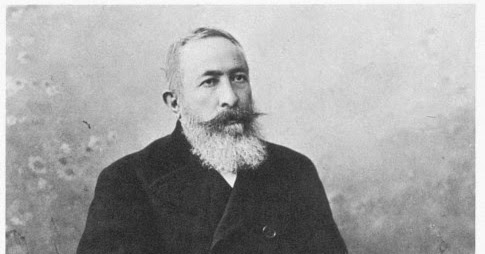AL-KHALIDI, YOUSEF DIYA’ EDDIN (PASHA) (1842-1906)
Born in Jerusalem in 1842; studied at Al-Aqsa Mosque, Jerusalem, in Malta at the Protestant School, and later one year of Medicine in Istanbul; then change his major to Engineering and moved to Robert College, US, but had to return to Jerusalem after a year following his father’s death; established a school in 1867; became mayor of Jerusalem for six years, starting in 1867; worked as translator at the Sultan’s Office in Istanbul in 1874; held various administrative and consular posts in the Ottoman Empire, incl. Ottoman Vice-Consul at the Russian Black Sea port of Poti; was a lecturer in Arabic Language at the School of Oriental Languages in Vienna in 1875; returned to Jerusalem later that year and became mayor; was interested in the issue of non-Muslim minorities in Jerusalem and wrote about the situation of Jews in the city, published in the London-based The Jewish Chronicle; in 1877, was elected representative of Jerusalem to the Otto‑man parliament, where he was the only member representing Palestine and an active member of the opposition; was one of ten opposition members who were sent into exile by Sultan Abdul Hamid for their criticism in Feb. 1878; worked again as lecturer at the University of Vienna in 1879; returned to Palestine in 1881 and was appointed governor of Jaffa, then of Marj Iyun, Lebanon, and of the Kurdish province of Motki, Turkey; at the latter post he learned Kurdish and wrote the first Kurdish-Arabic Dictionary (published in Istanbul in 1893); addressed a letter to the Chief Rabbi of France, Zadok Kahn, in 1899 pointing out that Palestine could only be acquired by war; called on the Jews to leave Palestine alone (“In the name of God, let Palestine be left in peace”); during his time as mayor, many streets and sewage lines were established and/or repaired and a road to Jaffa was paved; was one of four Palestinians on whom the Ottoman State bestowed the title of ‘Pasha’ while being alive (in addition to Musa Kathem Husseini, Abdul Salam Al-Husseini and Aref Bakr Ahmad Suleiman Al-Dajani); died in Istanbul in 1906.

الخالدي، يوسف ضياء الدين (باشا) (1842 - 1906) من مواليد عام 1842؛ درس في المسجد الأقصى بالقدس، في مالطا بمدرسة البروتستانت، ثم في اسطنبول؛ ثم غير تخصصه إلى الهندسة وانتقل إلى كلية روبرت في الولايات المتحدة الأمريكية، ثم اضطر للعودة إلى القدس بعد سنة من وفاة والده؛ أسس مدرسة عام 1867؛ رئيس بلدية القدس لستة سنوات ابتداءً من عام 1867؛ عمل مترجماً في مكتب السلطان العثماني في اسطنبول عام 1874؛ تولى عدة مناصب إدارية وقنصلية في الإمبراطورية العثمانية، بما فيها نائب القنصل العثماني في ميناء البحر الأسود؛ محاضر في اللغة العربية في مدرسة اللغات الشرقية في فيينا عام 1875؛ عاد إلى القدس في وقت لاحق من تلك السنة وأصبح رئيس بلدية القدس؛ أبدى اهتماماً في قضية الأقليات غير المسلمة في القدس وكتب عن وضع اليهود في المدينة، ونشر مقالات في صحيفة The Jewish Chronicle ومقرها الرئيس في لندن؛ انتخب ممثلاً عن القدس في البرلمان العثماني حيث كان النائب الوحيد الذي يمثّل فلسطين وكان عضواً ناشطاً في المعارضة؛ كان من بين عشرة أعضاء معارضين الذين أرسلهم السلطان عبد الحميد إلى المنفى في شهر شباط/ فبراير عام 1878 لانتقادهم لسياساته؛ عمل أيضاً محاضراً في جامعة فينا عام 1879؛ عاد إلى فلسطين عام 1881 وعين حاكماً لمدينة يافا، ثم حاكماً في مرج العيون في بيروت، ثم حاكماً لمقاطعة موتكي الكردية في تركيا؛ وفي منصبه الأخير تعلم اللغة الكردية وكتب أول معجم كردي - عربي نشر في اسطنبول عام 1893؛ وجّه رسالة إلى رئيس الحاخامين في فرنسا، زادوك خان، عام 1899 مشيراً إلى أنه لا يمكن الحصول على فلسطين؛ طالب اليهود بالتخلي عن مشروع الاستيطان الكولونيالي في فلسطين “أدعوك باسم الله، أن تتركوا فلسطين لأهلها بسلام”؛ وخلال رئاسته لبلدية القدس، أسس و/أو أصلح العديد من الشوارع وخطوط المجاري ورصف الطريق إلى يافا؛ كان من ضمن أربعة فلسطينيين الذين منحهم السلطان العثماني لقب “باشا” بينما كان على قيد الحياة )بالإضافة إلى موسى كاظم الحسيني، عبد السلام الحسيني، وعارف بكر أحمد سليمان الدجاني؛ توفي في اسطنبول عام 1906.
